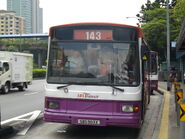| Volvo B10M | |
|---|---|
 A Stagecoach West Scotland-owned Volvo B10M. | |
| Manufacturer | Volvo |
| Replaced | Volvo B58 |
| Operator(s) | A number of operators in the world |
| Specifications | |
| Floor type | Step entrance |
| Engine(s) | Volvo 9.6L horizontally mid-mounted I-6 THD100/THD101/THD102/THD103/THD104/DH10A (Max. 2200 rpm) |
| Options | Various customer options |
The Volvo B10M is a popular mid-engined bus and coach chassis built by Volvo between 1978 and 2001. It was built as the successor of the B58 and was equipped with a 9.6-litre horizontally-mounted Volvo THD100/THD101/THD102/THD103/THD104/DH10A diesel engine mounted under the floor, near the middle of the chassis, slightly toward the front. An articulated version under the model name Volvo B10MA was also offered.
A large portion of B10M chassis were built in Sweden, but some were built (and bodied) in other countries such as the United Kingdom, Australia, Brazil, China and the United States (Chesapeake, Virginia).
The B10M was one of the best-selling PSV chassis in the United Kingdom throughout the 1980s and 1990s. Having originally been produced only as a coach chassis, the B10M was made available as a bus, in which form it was also very popular. Having found instant favour with Shearings, Wallace Arnold and Park's of Hamilton, the B10M as a coach is highly popular among UK coach operators, with hundreds of them in use every day.
A double-deck version of the B10M was developed for Strathclyde PTE in 1981. It was launched in early 1982, with a downrated engine from the coach, and was named Citybus (also known unofficially as B10MD or D10M). Most early examples were bodied by Alexander Coachbuilders, who provided a modified version - common to all Volvo double-deck chassis bodied by the company after 1980 - of their popular and attractive R type bodywork. Eastern Scottish and Fife Scottish bought many of these early versions in 1985-1987. Two were exported in 1984, one of them was received by Singapore Bus Services of Singapore, and the other one became Kowloon Motor Bus VMD1, but the latter was destroyed by fire in 1988. The Citybus lasted until the end of B10M production but fell out of favour after Volvo re-engineered the Leyland Olympian as its own, i.e. the Volvo Olympian.
In the 1990s, Stagecoach standardised on the bus version of B10M as their full-size single decker and they are still going today. Most of them had Alexander PS type bodies but some were delivered with Northern Counties Paladin bodywork. They also took numerous examples of the coach version with Plaxton's Interurban bodywork and Jonckheere's Modulo bodywork. South Yorkshire Transport (Mainline Buses) and Kelvin Central Buses (both companies are now subsidiaries of the FirstGroup) also purchased large numbers of the type with Alexander PS bodies.
The B10MA articulated variant was of limited popularity among bus operators in the UK. British Caledonian Airways took four in 1988, the next examples sold in Britain were supplied eight years later, with the delivery of four to Ulsterbus. Stagecoach was the biggest customer for the model in the UK, taking 18 for its subsidiaries between the mid- to late-1990s, with the last delivered in 1999.
Singapore Bus Services (Now SBS Transit) of Singapore has purchased a total of 977 units from 1986 to 2001, making up a large part of its bus fleet. First delivered in 1988, they are bodied by Duple Metsec and Walter Alexander. A single 19m B10MA articulated bus (registered as SBS 998Y) has also been built, but it has since been sold to New Zealand in 2006. The 1986 Van Hool bodied prototype and 1988-89 production versions (known as Mark II) were scrapped in 2008.
From 1983 to 1986, a number of B10M was built and used in the United States. The American B10M was manufactured mostly in its articulated form (which was purchased by SEPTA, SamTrans, and New Jersey Transit) though a standard length B10M model was made for the RIPTA with one example going to SEPTA as compensation for delays. Canadian production of the B10M articulated under licence to Ontario Bus Industries nearly took place, however it fell through when that company negotiated a more favorable deal with Ikarus Bus.
Metro Tasmania in Tasmania, Australia purchased ten B10M articulated buses in 1985-86 with PMC Adelaide (now part of Custom Coaches) 2-door bodies and another nine in 1986-87 with PMC Adelaide 3-door bodies, most of which are still in service (early 2010) although the first one, unit 704 has been withdrawn from service and sold. In 1987 4 B10M rigid chassis with PMC Adelaide 2-door bodies were purchased. All of these have now been withdrawn from service. All of the Metro B10Ms were fitted with 4-speed ZF automatic transmissions and were allocated to Hobart.
In New Zealand, two Volvo B10M 2-axle buses with VoV B45D bodies built by Coachwork International were ordered by Auckland Regional Authority in 1985. Licence fees associated with fitting the VoV body to a non-German chassis lead to the volume order for 88 buses going to MAN. These are the only Volvo buses to receive the VoV body.
The articulated version of the B10M (constructed by Saracakis in 1993, 1995 and 1997) is also used in Thessaloniki.
The B10M as a single-deck bus was complemented (and was largely replaced) by the low-floor rear-engined B10L and B10BLE chassis in some markets in the late 1990s. In 2001, the B10M was eventually replaced by the new Volvo B12M and Volvo B12B, both chassis sporting a larger 12-litre engine.
Gallery[]
| ||||||||||||||||||||||||||
| This page uses some content from Wikipedia. The original article was at Volvo B10M. The list of authors can be seen in the page history. As with Tractor & Construction Plant Wiki, the text of Wikipedia is available under the Creative Commons by Attribution License and/or GNU Free Documentation License. Please check page history for when the original article was copied to Wikia |















